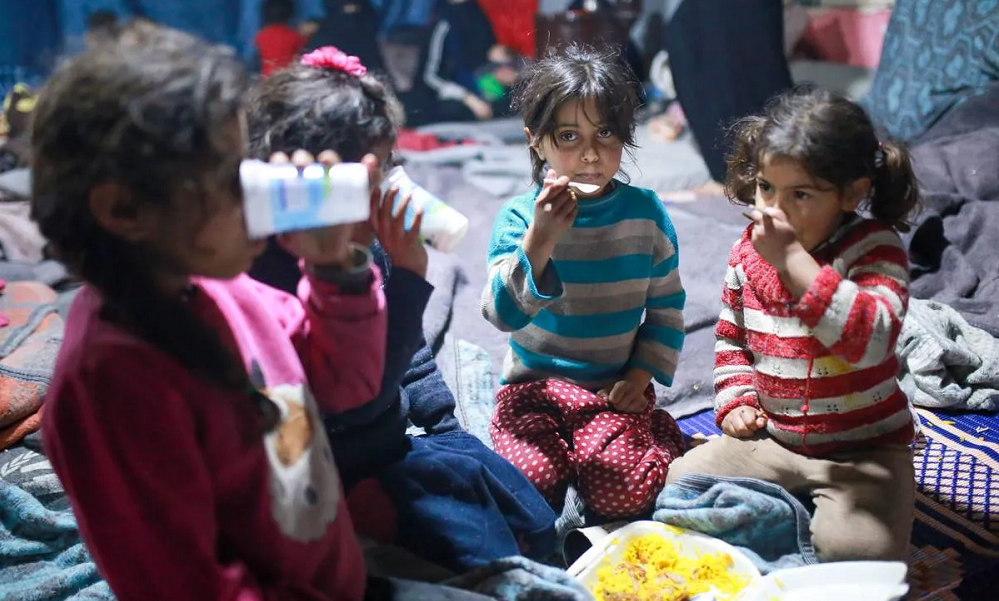Health
Mental health of 7 million children at risk after Turkey quakes

The mental health and wellbeing of seven million children is at risk for years to come after last week’s devastating earthquakes in Turkey and Syria, Save the Children has warned, adding that some are showing signs of acute distress including nightmares, aggression, or being withdrawn.
Around 23 million people have been impacted by the earthquakes, many of whom have witnessed their friends and family members die before their eyes. Others have been buried under the rubble of their collapsed homes. Many now still don’t have anywhere safe to go.
Children who have experienced extremely distressing events or repeated stress are more likely to have long-lasting impacts for months or even years to come unless more mental health and psychosocial support is urgently provided alongside humanitarian aid.
Aiida, a psychologist working for Save the Children, said: “In these cases, children are at risk of developing mental health difficulties, particularly as there were several events one after another, earthquakes with ongoing aftershocks, with no period for recovery.”
“In the long-term, this can impact many aspects of a child’s life, including difficulties with learning, concentration and school performance. A child who has experienced life-threatening events may remain primarily focused on feeling safe and function in survival mode – what we can also call a flight, fight or freeze response.”
After 12 years of conflict and economic crisis, the mental health needs in Syria were already significant before the earthquakes. According to UN data from December 2022, nearly half of all children surveyed were showing signs of psychological distress, and 26 per cent of households reported the reason their children did not want to go to school was because they felt depressed, unhappy or lacked motivation, Middle East Monitor reported.
The fact that the earthquakes and shockwaves took place when people were in their homes at night increased their sense of fear.
For young children, increased clinginess and anxiety upon separation is being observed, with children needing to sleep next to their caregivers at night and stay next to them during the day, the charity warned. “Overexposure to distressing news and images circulating through social media is also playing a role in children’s stress levels especially among teenagers.”
Health
Azerbaijan urged to help improve capacity of Afghan health workers

Acting Minister of Public Health Qalandar Ebad, in a meeting with Azerbaijan’s ambassador, Ilham Mohammadov, called for the country’s assistance in improving the capacity of Afghanistan’s health workers.
The two sides also discussed cooperation in the health sector, capacity building of Afghan health workers, and Azerbaijan’s role in the health sector and other issues, according to a statement released by the Public Health Ministry.
Azerbaijan’s envoy said that his country seeks to cooperate with Afghanistan in a sustainable manner in the field of health.
In other news, the foundation stone for the construction of oxygen production facility was laid at the Indira Gandhi children hospital in Kabul.
Officials of the Ministry of Public Health said that the facility will be built with the financial and technical assistance of the World Health Organization, and with the capacity to produce 200 cylinders of oxygen daily to meet not only the needs of the hospital, but also other health facilities.
Health
Balkh health officials report sharp increase in number of cancer patients

Balkh Public Health Department officials say there has been a significant increase in the number of patients with cancer in the province.
“In 1401, about 2,613 OPD (out patient department) cases were registered with us. In 1402, these figures were 4,912 cases,” said Ehsanullah Kaliwal, the head of the oncology department at Balkh Regional Hospital.
Some doctors say genetic factors, environmental pollution, arbitrary use of medicines, and excessive consumption of meat were reasons for the sharp increase.
One doctor said cancer was also hereditry.
However, a large percentage of cancer patients in Balkh have stomach cancer. Many of them have appealed for the government to improve treatment facilities.
According to health officials, in the first month of this solar year (April), 423 cancer patients visited this hospital for treatment.
Health
Majority of Afghans with mental disorders are women: officials

Based on last year’s data, 52 percent of people with mental disorders in Afghanistan are women, the Ministry of Public Health said.
However, after the Islamic Emirate took over the country and with the improvement of nationwide security and the provision of better health services, mental disorders have decreased, the ministry said.
“Overall, the mental security of men and women in Afghanistan is not ensured and their mental security is disturbed. According to the figures shared with us, in 2023, 52 percent of the visitors for mental disorders were women,” said Sharaft Zaman Amarkhil, the spokesperson of the Ministry of Public Health.
“Generally speaking, we can say that compared to the past, the instances of mental illnesses have decreased,” he added.
People suffering mental disorders mostly refuse to share their problem, willingly or unwillingly.
“There are many problems at home; We are poor. I finished school, but didn’t find any job,” Ansar, a mentally ill person, said.
According to the World Health Organization (WHO), half of Afghanistan’s population suffers from mental distress.
Factors such as unemployment, poverty, domestic violence, ban on girls’ and women’s education and work, and drugs are said to be key contributors to mental distress.
-

 Latest News4 days ago
Latest News4 days agoPakistan’s frontiers minister stresses ‘dignified’ return of Afghan refugees
-

 Regional3 days ago
Regional3 days agoIranian president lands in Pakistan for three-day visit to mend ties
-

 Climate Change4 days ago
Climate Change4 days agoMassive river flooding expected in China, threatening millions
-

 Latest News2 days ago
Latest News2 days agoRashid Khan named AWCC’s brand ambassador
-

 Latest News4 days ago
Latest News4 days agoChinese keen to invest in Panjshir-Kabul water conduit project
-

 World4 days ago
World4 days agoTwo Japan navy helicopters crash, one body found, 7 missing
-

 Sport3 days ago
Sport3 days agoKolkata beat Bengaluru by one run in IPL as Kohli fumes at dismissal
-

 Sport3 days ago
Sport3 days agoACL: Aino Mina 3-0 Istiqlal Kabul; Attack Energy 3-0 Khadim
























